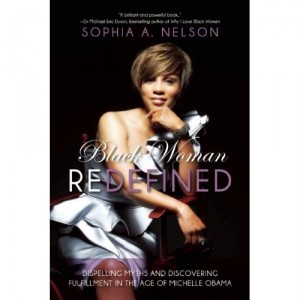
Today’s Q&A is with Sophia A. Nelson, author of the new book, Black Women Redefined: Dispelling Myths and Discovering Fulfillment in the Age of Michelle Obama (BenBella). What the heck does this have to do with your veil selection or reception centerpieces you’re wondering? Well, everything.
Truthfully, I struggled on how this piece would fit here on Triple B. I created this site as a bridal resource for Black women preparing to tie the knot who were too often being neglected elsewhere. I think everyone regardless of race, class or culture (especially women) should be celebrated but as mainstream media continually shows us, the playing field is still not level. My internal struggle ended with that ridiculous Psychology Today article and the viral Dark Girls video that became topics of conversation at every brunch and dinner party I’ve attended over the last few weeks. Before we can get to the pretty gowns and flowers, we should take a look at what lies within. Sophia’s book tackles topics like demanding careers, Daddy issues and the “bitter and lonely” myth. Here we go:
Black Bridal Bliss: How has First Lady Michelle Obama changed (or not) the image of the modern Black woman in America?
Sophia A. Nelson: She is changing it greatly. The data in my book shows that 87% of African American women feel she has “dispelled myths” and shifted opinions about Black women for the better in dramatic ways. Over 78% of Black men feel the same and said they wanted their own “Michelle Obama”. I opened the book with an “Open Letter to Mrs. Obama” because she is the perfect role-model for young Black women of Gen X & Gen Y that they can in fact have it all: Love, marriage, children, great career, and public service.
BBB: How much do you think mainstream media plays up the stereotype that successful Black women are lonely and bitter?
Nelson: It plays a huge role. I have found that mainstream media will give great coverage to studies done on us pronouncing the negative but when a study on us really addressing why things may be as they are or putting into context certain behaviors—they will not cover it. Last year all we heard was 70% of Black women were unmarried, the Black marriage negotiations video went viral and there was the “why can’t successful Black women get a man” Nightline special. I find it stunning that not one news organization has covered this groundbreaking and comprehensive study on Black women.
BBB: Do you think daunting statistics about Black women and marriage leaves Black women feeling less than optimistic about their own changes of ever getting hitched?
Nelson: I am not sure I buy into the statistics in general. The Census data for example is skewed; they include 15-18 year olds in their count of Black women who are single—I mean duh—how many 15-18 year olds do you know who are married? However it is true that the more educated and successful a woman becomes the more challenging it is for her to find a mate , get married and have kids. That is what my focus was on because that is the group of Black women that is most under attack and scrutiny. The answer to your question, is maybe. The key is for us to readjust the standards for ourselves in a healthy way. Marriage needs to be stressed for our sisters at an earlier age. We need to teach our young brothers that they fair better in life with a wife, partner and family then when they run with 10 women at a time, have kids out of wedlock and not care for those kids as they should. We have to stop just talking to our young women and speak to our young men as well.
BBB: The title of your book is Black Women Redefined which is quite fitting because when I interview brides for our Tie the Knot Tuesday feature, I’m reminded that there is no such thing as cookie-cutter relationship. Every couple has a story and it is never a “fairytale”. How do you think Black women can learn that they’re entitled to true love but it might not fit their preconceived notions of the “perfect package” when it arrives?
Nelson:True love starts with self love. It took me until I was in my late 30s to figure this out. I had (still have) major issues with my father. That really affects a girl who becomes a woman. Many Black women struggle with this one. Many. I want young sisters to know love is so very important. It is everything in your life and as you age, you feel that void so much more when there is no-one to share coffee with, walk with, hang-out with, travel with, have a fulfilling sex life and relationship with. Love comes in many shades, sizes, ages, and seasons in our lives. You never know when love will find you and what it will look like. Be OPEN sisters—Be OPEN!
This is heavy stuff, folks. But I want to know your thoughts on Nelson’s responses — good, bad or indifferent. Please sound off and don’t hold back.


Bridgette! Thanks so much for this article. Funny thing is, that I heard of this book for the very first time today and after hearing a bit about it I was thinking of getting it, then sure enough after I read this article I went and ordered it on my Kindle! Yay, can’t wait to read it…
I enjoyed this feature so much that I’m going to get this book. Thanks!